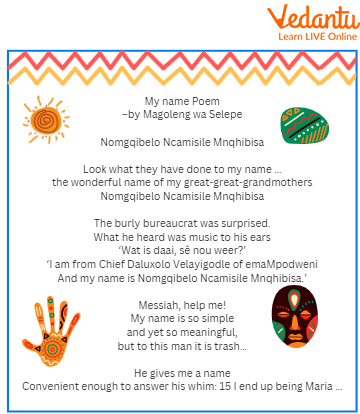Overview of My Name Poem
Names are the basis of the identity of any person. Names are the first thing anyone intends to know about the other person. It distinguishes one from hundreds of other people. Our parents keep our names with hidden meanings inside them. They research and then come up with a sweet yet powerful name. Names are not just mere syllables or strings of sound; they are so much more than that. They are your identity; they are your heritage.
In this article, we will read one of the most beautiful name poems with a compelling message in it. We will discuss the circumstances in which the poet wrote this poem. So, let's dive into the article.
Names Poem for Kindergarten
My Name Poem By Magoleng wa Selepe
Nomgqibelo Ncamisile Mnqhibisa
Look what they have done to my name …
the wonderful name of my great-great-grandmothers
Nomgqibelo Ncamisile Mnqhibisa
The burly bureaucrat was surprised.
What he heard was music to his ears
‘Wat is daai, sê nou weer?’
‘I am from Chief Daluxolo Velayigodle of emaMpodweni
And my name is Nomgqibelo Ncamisile Mnqhibisa.’
Messiah, help me!
My name is so simple
and yet so meaningful,
but to this man it is trash…
He gives me a name
Convenient enough to answer his whim: 15 I end up being
Maria …
I …
Nomgqibelo Ncamisile Mnqhibisa.

Short Poem About My Name
Theme and Meaning of the Poem
There is a use of three languages in this poem, first, the narrator’s name in Xhosa (a native African language) second, the government bureaucrat’s Afrikaans (which evolved from their accent), and third the narrator’s replies in English. The narrator did not reply in the Afrikaans language because Africans saw it as the language of the discrimination that the European government did in Africa. Under European rule, Africans were required to have European names at school, in church, at work and everywhere and also in their formal documents.
The poem also highlights the system of Apartheid that was prevailing in South Africa. The poem focuses on the ease with which the bureaucrats of the European government in Africa change her name to illustrate the plight of black people in South Africa during Apartheid.
The bureaucrat showed no respect for Nomgqibelo’s name. Instead, he cruelly dismissed it and then simply changed it to Maria because he himself could not understand and pronounce her name. It is the ease with which the bureaucrat disregards the woman’s name that distresses the poet and conveys to the reader the difficulty that black South Africans face.
In any society, the individual is often shaped by the actions and beliefs of their ancestors; in other words, culture shapes our identity, which our ancestors believed in. So, in the poem, the disconnection from the name of her ancestors by the Europeans, who due to their inability to pronounce the names, used to change the names of African people into simple and meaningless names, has led to the persona losing cultural identity.
European identity has been forced upon her, which she can never fully assume. There is no cultural history linked to the name “Maria” in African heritage; she has lost one identity only to be denied another.
History of the Poem
Names are an essential part of our identities. Our names given by our family often connect us directly to our culture, the beliefs of our forebears and our histories. In 1652, when Europeans first settled in South Africa, the land was already populated. Colonial rule and the European government had major impacts on how Africans were allowed to express their identities, including the power of naming. The South African poet Magoleng wa Selepe captures the power of colonialism to shape people’s identities in the poem “My Name.”
The poet tries to show the readers the plight of African people and how they were denied the basic right to choose their names.

African people
Names Poem Summary
This poem concentrates on the problem of discrimination that prevailed during earlier times, especially the problem of discrimination on the basis of race. The two main points in this poem are the loss of identity of a person by losing his or her name and the inability to connect with people of other cultures because of discrimination.
Through this article, we learnt how a name is not only a word that differentiates individuals but also something that creates an individual and gives power to his very existence. We hope you enjoyed reading this article as well as the names poem summary.


FAQs on My Name Poem
1. What does the phrase 'look what they have to my great grandmother's name' mean?
The poet wants to tell through this phrase that she has been separated from the history of her family and their names. Her name has been changed, which severed the ties between her and her family legacy.
2. When did the poem 'My Name' first appear in the magazine?
Although it is unclear when the poet wrote the poem 'My Name', it first appeared in the magazine in 1979.
3. What is the Afrikaans language?
Afrikaans is a language that evolved in the Dutch Cape Colony and was used by Dutch, French, and German settlers in Africa and their slaves.





